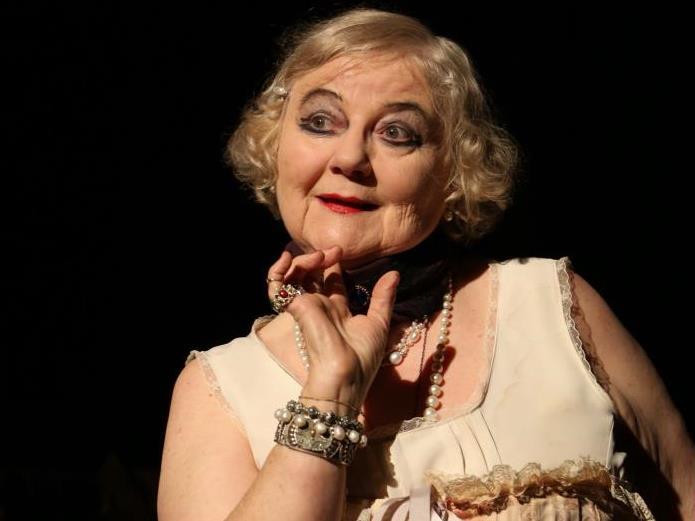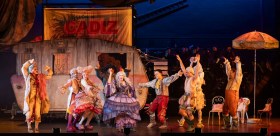Chrissie Shaw brings Bijou to life. Photograph via Bijou Cabaret.
Inspired by an iconic Brassaï photograph from his 1933 Paris by Night collection, this cabaret is deeply nostalgic but also refreshingly different and authentic because the star of the show makes a virtue of her wrinkles, wobbling flesh and a voice that’s worn around the edges.
Brassaï’s La Môme Bijou captures a woman sitting alone at a Paris cafe. Physically and sartorially well past her prime, her jewellery and look of proud defiance nevertheless suggests a glorious past. Bijou: A Cabaret of Secrets and Seduction imagines a back story for this intriguing figure. Weaving together what little is known, or at least rumoured, about the woman in the photo, Parisian history of the late 19th and early 20th centuries, and a generous dose of tragi-comic fiction, writer-actor Chrissie Shaw creates a compelling, complex and believable character.
In a fast-paced hour-long show (seemingly edited down from a slightly longer version presented elsewhere in the country), it’s as if Shaw’s Bijou has just emerged from the photograph. With words that merge into songs accompanied by pianist Alan Hicks, and some light choreography, she recounts episodes from her life in chronologically haphazard fashion, through war, wealth, poverty and seduction. The latter is integral to the story, as Bijou is seduced (including as a little girl – one of the show’s most powerful moments) or is the seducer, turning the tables on men as a showgirl, courtesan and brothel owner. Through the tragic veil of a flirtatious, faded old woman, she plays the innocent child, glamorous youth and rich but fragile middle-aged woman.
Even a fleeting familiarity with the relevant history (including the siege of Paris during the Franco-Prussian War and the Paris Commune) and the show’s heritage music reveals subtleties as well as considerable research. Hicks, who also sings a little as Bijou’s reluctant accompanist, effortlessly segues from tune to tune, era to era: Debussy, Strauss, Poulenc and Satie, and a parade of once popular songs, including Falling in Love Again, famously sung by Marlene Dietrich, first in German then in English. Shaw sings it in both languages, and frequently flits between English and French lyrics too. Her accents add to the show’s authenticity – she sings French like Piaf.
The music, the historic references and frilly, old-fashioned undergarments, which Shaw reveals in scenes of seduction and when inviting the audience to help her disrobe, are little pieces of a character who seems real. It is mostly Shaw, however, both her performance and willingness to reveal her ageing body, who brings authenticity to this character (even if her spoken accent is plummy Australian, not Parisian).
Lurking in the subtext, beneath the fact that Bijou is essentially a fictional character, is the possibility that there is another layer of truth. That all the jewels draped around her neck, jammed onto every finger and hidden in the folds of her well-worn finery, may not be fake just in terms of costume. Is Bijou’s jewellery, as well as her stories, part of a tragic facade? This sneaking suspicion only adds to the enjoyment of a show that beautifully balances authenticity with imagination.
Rating: 4 stars out of 5
Bijou: A Cabaret of Secrets and Seduction
Bijou Chrissie Shaw
Piano Alan Hicks
Writer Chrissie Shaw
Director Susan Pilbeam
The Butterfly Club 23-27 November





